Case Law Details
Mysore Race Club Limited Vs ACIT (ITAT Bangalore)
The Income Tax Act prescribes deduction of tax at source u/s 192 to 195 of the Act. The assessee would be liable to deduct tax at source only in respect of payments which are covered by above said sections. The case of the assessee is that it has paid subsidy which is in the form of either reimbursement of part of expenses or absorption of certain expenses in maintenance of horses, transportation and contribution to welfare funds. None of these payments would fall under sec. 192 to 195 of the Act requiring deduction of tax at source. We notice that the A.O., without pointing out the section under which the assessee would be liable to deduct tax at source in respect of above said payments, has simply disallowed the subsidy payments by invoking the provisions of section 40(a)(ia) of the Act. We notice that the Ld. CIT(A) also confirmed the addition by observing that the assessee should have obtained no deduction certificate u/s 197 of the Act, meaning thereby, the Ld. CIT(A) has also not pointed out the section under which the above said payments would attract TDS liability.
A perusal of the explanation furnished by the assessee would show that
(a) the assessee is absorbing part of cost of fodder purchased for feeding horses. The payment made for purchase of fodder does not attract any of the TDS provisions. In this case, the assessee is charging the cost of fodder at lower rate. Thus, this does not amount to payment to anyone, which would attract TDS provisions under any of the sections.
(b) in respect of transport subsidy also, we notice that the assessee has met part of transportation expenses incurred by the horse owners in the form of reimbursement made to them. The primary liability to deduct TDS would lie upon the horse owners, since they have incurred the cost of transportation. The assessee has only reimbursed part of transportation cost to the horse owners. Accordingly, in our view, this payment will also not liable for deduction of tax at source.
(c) the two-year old subsidy is also a kind of reimbursement to groom horses and the same, in our view, would also not attract provisions of TDS.
(d) payment to jockeys and trainers fund and employees welfare society is a kind of contribution connected with the business activities of the assessee and the said payments are also not covered by any of the TDS provisions.
(e) the last item “Syces subsidy” is the money paid to the owners of horses from out of stake money and it would also be not covered by any of the TDS provisions.
Accordingly, we are of the view that the disallowance made by A.O. u/s 40(a)(ia) of the Act in respect of subsidy expenditure is not in accordance with law and the Ld. CIT(A) was not justified in confirming the said addition. Accordingly, we set aside the order passed by the Ld. CIT(A) on this issue and direct the A.O. to delete the disallowance.
FULL TEXT OF THE ORDER OF ITAT BANGALORE
Both the appeals preferred by the assessee are directed against the orders passed by Ld. CIT(A), Mysuru and they relate to the assessment years 2009-10 & 2013-14. Since common issues are urged in these appeals, they were heard together and are being disposed of by this common order, for the sake of convenience.
2. The common facts are that the assessee is engaged in the activity of conducting horse racing and on and off course betting. The public at large could place bets on horses either at the race course or through the counters placed outside the race course. The person who places bet on horses are called “Punters” and if the horse on which he has placed bet wins the race securing particular rank (1st or 2nd or 3rd etc.), he will get prize money according to the pre-determined rates, which is the combination of multiplying factor for each of the horse and the rank. The public can place their bets either at the totalizator or with the registered book makers who are licensed to bet in the race course. The assessee would be entitled to receive commission amount from totalizators and book makers. Accordingly, the assessee has accounted for only commission amount including totalizator tax in its books of account on the reasoning that its income consists of commission income only. Accordingly, the assessee did not account for betting amount paid by the punters and disbursement of prize money/dividend to them in its books of accounts on the reasoning that those transactions are diverted at source. It was also submitted that the punters who bet at the totalizators have not direct contact with the assessee and the betting tax payable on betting amount is collected and paid to the State Government under the Betting Tax Act.
3. The facts relating to AY 2009-10 are that the assessee filed its return of income for assessment year 2009-10 on 5.10.2009 declaring loss of Rs.1.77 crores, which was processed u/s 143(1) of the Income-tax Act,1961 [‘the Act’ for short]. Subsequently, the A.O. reopened the assessment u/s 148 of the Act, as the A.O. was of the view that the assessee should have declared the entire amount received at the betting counter as its income and the disbursement of prize money/dividend as its expenditure. In this regard, the A.O. took support of the decision rendered by Hyderabad bench of Tribunal in the case of Hyderabad Race Club Vs. JCIT (2009) 25 DTR 0209. In the reopened the assessment, the AO examined the payments made to punters as prize money/dividend and noticed that the assessee has made cash payments exceeding Rs.20,000/- in violation of section 40A(3) of the Act. Accordingly, he disallowed a sum of Rs.81,04,548/- in assessment year 2009-10 u/s 40A(3) of the Act.
4. In assessment year 20 13-14 also, the A.O. noticed that the assessee has not accounted for the betting money received and prize money/dividend amounts disbursed. In this year also, the A.O. took the view that the assessee should have routed the above said collections and payments through the profit & loss account. He also noticed that the assessee has made payments by way of cash in violation of section 40A(3) of the Act. Accordingly, he disallowed a sum of Rs.49,95,095/- u/s 40A(3) of the Act. The A.O. also noticed that the assessee has made certain payments on which it has not deducted tax at source. Accordingly, he disallowed following amounts u/s 40(a)(ia) of the Act.
| a) Subsidy amount | Rs.2,69,94,732/- |
| b) Contribution to Turf authorities | Rs.20,00,000/- |
| c) Dope testing charges | Rs.54,97,036/- |
The A.O. also made certain other additions but the same were deleted by Ld. CIT(A).
5. The first common issue contested by the assessee is whether the collections made from punters by totalizators/book keepers for participating in horse races and disbursement of prize money/dividend to them are diverted at source or not?
5.1 The Ld. A.R. submitted that this issue has been decided against the assessee by Hyderabad bench of Tribunal in the case of Hyderabad Race Club (supra), wherein the Hon’ble Hyderabad bench has taken the view that the amount collected by way of betting by punters needs to be treated as income of the assessee. The Ld. A.R. further submitted that the very same issue was considered by Mysuru Circuit bench of the Tribunal in the assessee’s own case in assessment year 2010-11 in ITA No.531 / Bang/ 2014 and the Tribunal, vide its order dated 23.3.2017, has restored this issue to the file of the A.O. for examining it afresh in view of certain contentions made by the assessee. The Ld. A.R. submitted that the coordinate bench has restored the issue after considering the decision rendered by Hyderabad bench of Tribunal in the case of Hyderabad Race Club (supra).
5.2 We heard Ld. D.R. on this issue and perused the record. We notice that an identical issue has been examined by Hyderabad bench of Tribunal in the case of Hyderabad Race Club (supra) and the same has been decided against the assessee. However, the coordinate bench in the assessee’s own case relating to assessment year 2010-11 has restored the issue to the file of the A.O, after considering the decision rendered by Hyderabad bench in the case of Hyderabad Race Club. The relevant discussions made by the coordinate bench in assessment year 20 10-11 are extracted below:-
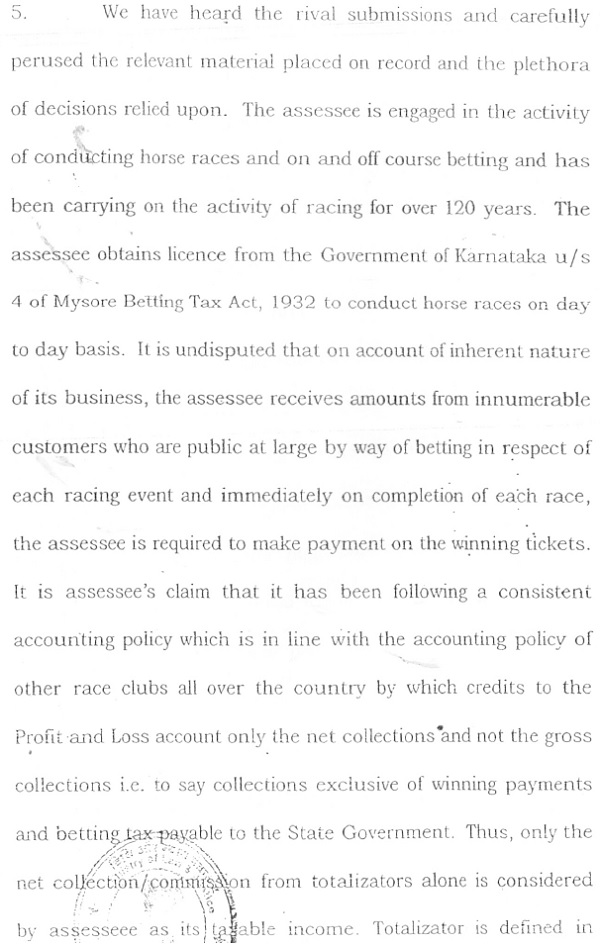
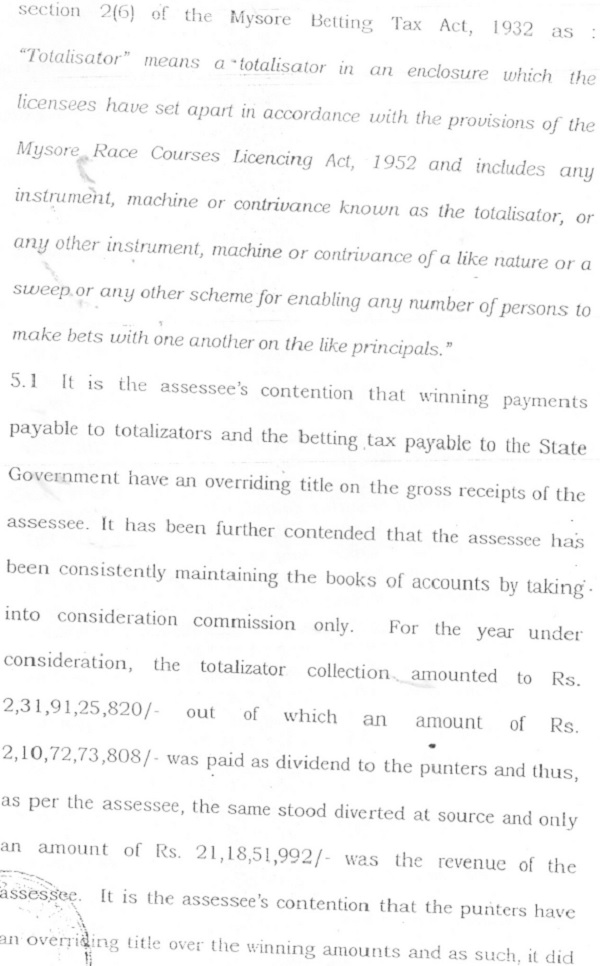
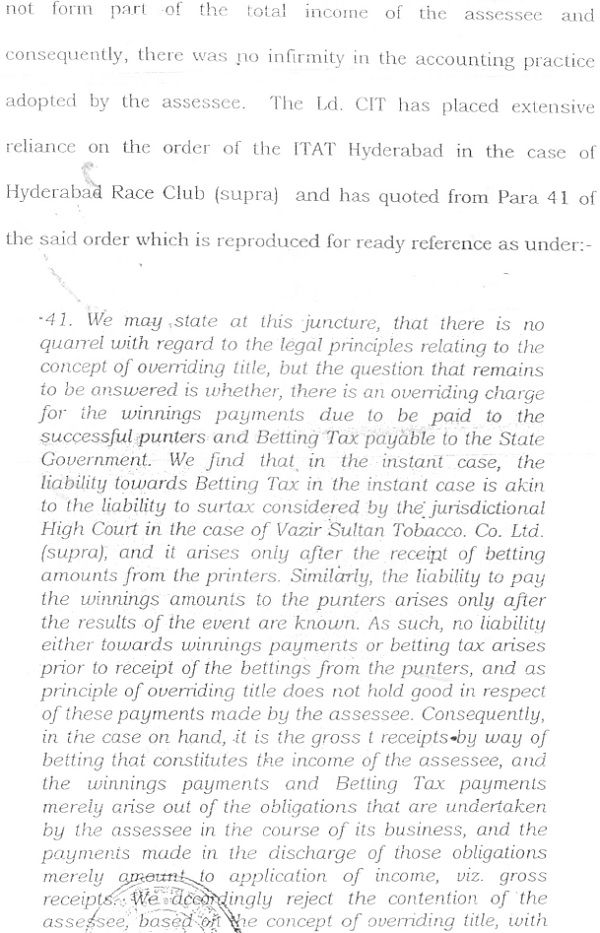
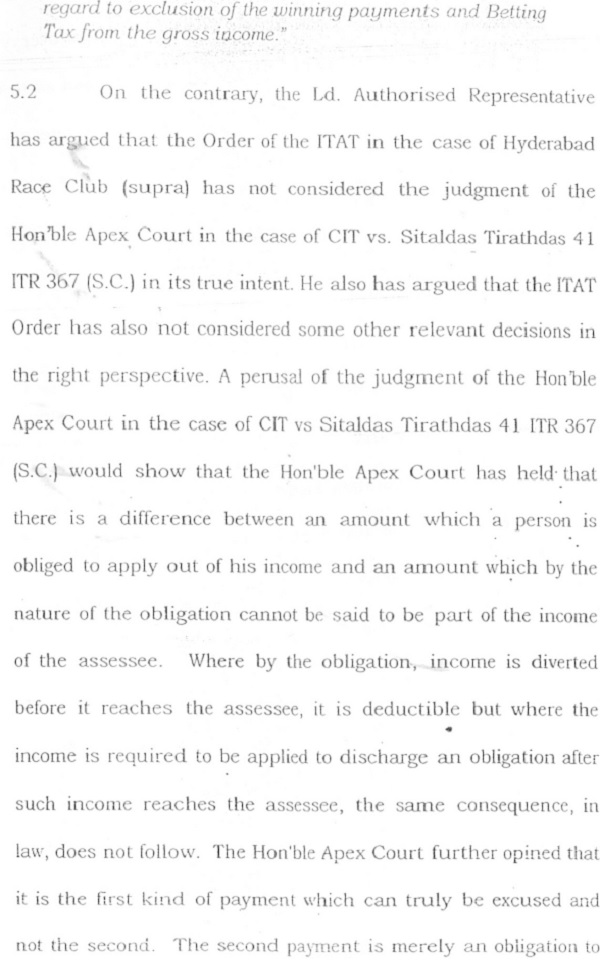
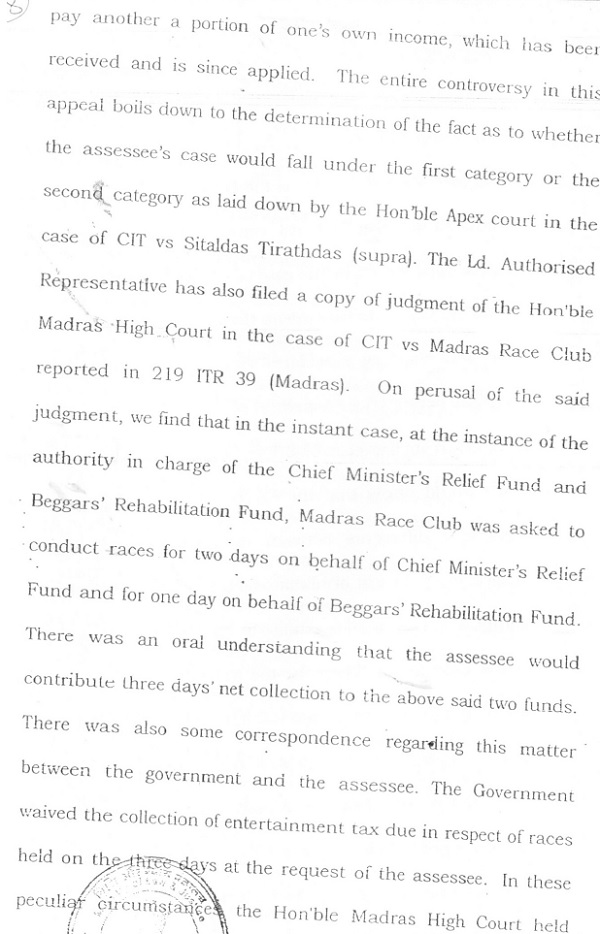
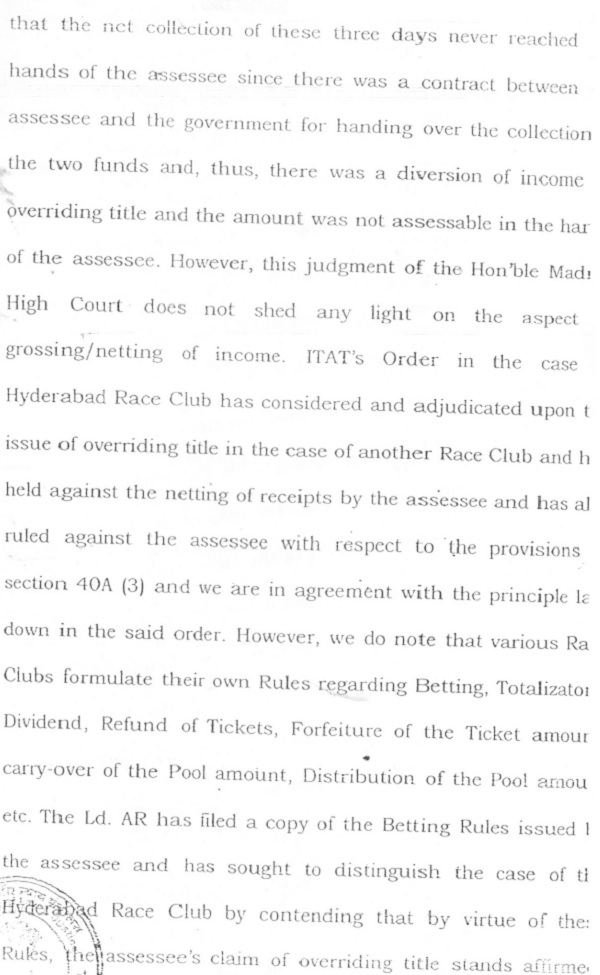
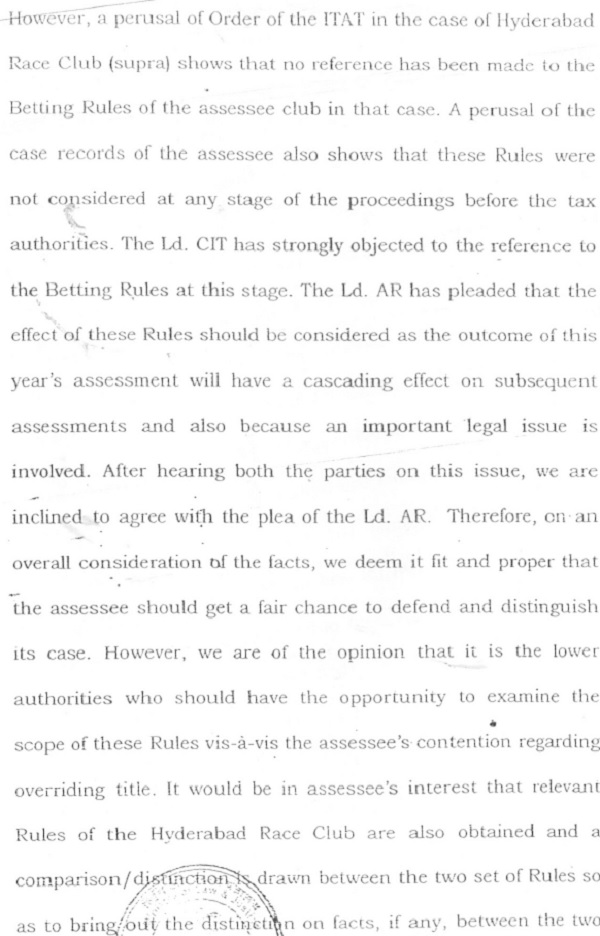
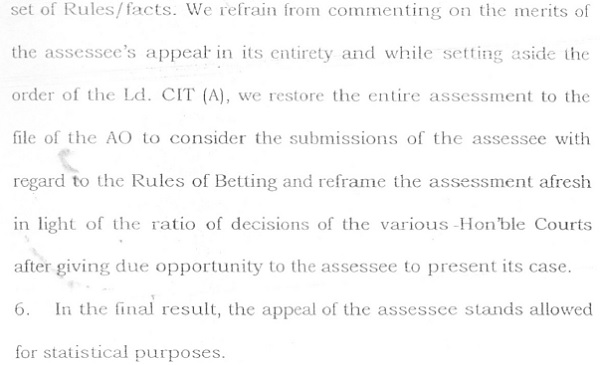
5.3 We notice that the decision rendered by the coordinate bench in the A.Y. 2010-11 has been followed in assessment year 2011-12 also in the assessee’s own case in ITA No.1480/Bang/2017. Since a particular view has been taken in assessee’s own case by the coordinate benches in Assessment years 2010-11 & 2011-12, following the same, we restore this issue to the file of the A.O. for examining it afresh in accordance with the directions given in assessment year 2010-11.
6. The next common issue relates to disallowance made u/s 40A(3) of the Act. This issue also requires to be restored to the file of the A.O. as the applicability of provisions of section 40A(3) of the Act would depend upon the decision taken by the A.O. with regard to the first issue discussed above, viz., whether there is diversion of income or not. The question of application of provisions of sec.40A(3) will not apply, if the assessing officer accepts the contention of the assessee that there is diversion of income and expenditure. Accordingly, we restore this issue in both the years to the file of the A.O.
7. Let us take the individual issues urged by the assessee in both the appeals. In AY 2009-10, the assessee is contending in ground no.5 that the Ld CIT(A) has not adjudicated the ground relating to the claim of carry forward and set off business losses. We notice that it is only a matter to be decided in accordance with law after verification of record. Accordingly, we restore this issue to the file of the AO. With the adjudication of this ground, the appeal of the assessee for AY 2009-10 stands disposed of.
8. The assessee has raised some more issues in AY 2013-14. The assessee has raised a legal ground stating that the Ld. CIT(A) has enhanced the total income of the assessee to Rs.4. 16 crores as against the total income of Rs.4.06 crores determined by the A.O., without giving reasonable opportunity to the assessee as per provisions of section 25 1(2) of the Act. However, we notice that the AO has committed an error in computing the total income, i.e., as against the total income of Rs.4. 16 crores, he has computed the total income at Rs.4.06 crores. We notice that the Ld CIT(A) has not enhanced any income as alleged by the assessee. In any case, the assessee has not pointed out the specific issue, which has resulted in enhancement of income as alleged in the above said ground. Accordingly, we dismiss the grounds relating to this issue.
9. The next issue contested in assessment year 20 13-14 is the disallowance made by the A.O. u/s 40(a)(ia) of the Act, which consisted of various types of payments. The first item of this issue relates to subsidy amount of Rs.2,69,94,732/- disallowed by the A.O. u/s 40(a)(ia) of the Act. The assessee has provided different kinds of subsidies, which has been explained as under in its written submissions. The Ld A.R contended that none of these payments would be liable for deduction of tax at source under any of the provisions of the Act.
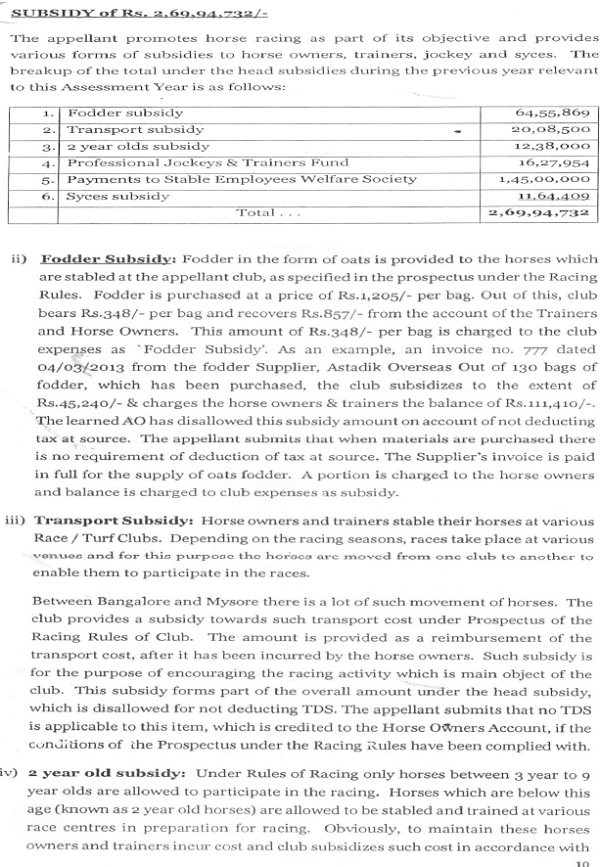
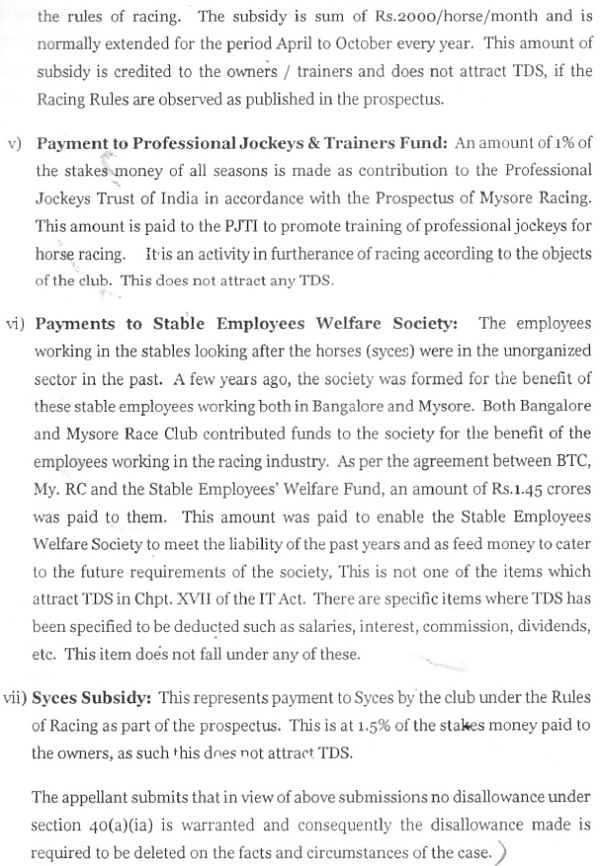
9.1 The Income Tax Act prescribes deduction of tax at source u/s 192 to 195 of the Act. The assessee would be liable to deduct tax at source only in respect of payments which are covered by above said sections. The case of the assessee is that it has paid subsidy which is in the form of either reimbursement of part of expenses or absorption of certain expenses in maintenance of horses, transportation and contribution to welfare funds. None of these payments would fall under sec. 192 to 195 of the Act requiring deduction of tax at source. We notice that the A.O., without pointing out the section under which the assessee would be liable to deduct tax at source in respect of above said payments, has simply disallowed the subsidy payments by invoking the provisions of section 40(a)(ia) of the Act. We notice that the Ld. CIT(A) also confirmed the addition by observing that the assessee should have obtained no deduction certificate u/s 197 of the Act, meaning thereby, the Ld. CIT(A) has also not pointed out the section under which the above said payments would attract TDS liability.
9.2 A perusal of the explanation furnished by the assessee would show that
(a) the assessee is absorbing part of cost of fodder purchased for feeding horses. The payment made for purchase of fodder does not attract any of the TDS provisions. In this case, the assessee is charging the cost of fodder at lower rate. Thus, this does not amount to payment to anyone, which would attract TDS provisions under any of the sections.
(b) in respect of transport subsidy also, we notice that the assessee has met part of transportation expenses incurred by the horse owners in the form of reimbursement made to them. The primary liability to deduct TDS would lie upon the horse owners, since they have incurred the cost of transportation. The assessee has only reimbursed part of transportation cost to the horse owners. Accordingly, in our view, this payment will also not liable for deduction of tax at source.
(c) the two-year old subsidy is also a kind of reimbursement to groom horses and the same, in our view, would also not attract provisions of TDS.
(d) payment to jockeys and trainers fund and employees welfare society is a kind of contribution connected with the business activities of the assessee and the said payments are also not covered by any of the TDS provisions.
(e) the last item “Syces subsidy” is the money paid to the owners of horses from out of stake money and it would also be not covered by any of the TDS provisions.
Accordingly, we are of the view that the disallowance made by A.O. u/s 40(a)(ia) of the Act in respect of subsidy expenditure is not in accordance with law and the Ld. CIT(A) was not justified in confirming the said addition. Accordingly, we set aside the order passed by the Ld. CIT(A) on this issue and direct the A.O. to delete the disallowance.
9.3 The next item disallowed u/s 40(a)(ia) of the Act is the contribution of Rs.20 lakhs made to the turf authority. The assessee has offered following explanation:-
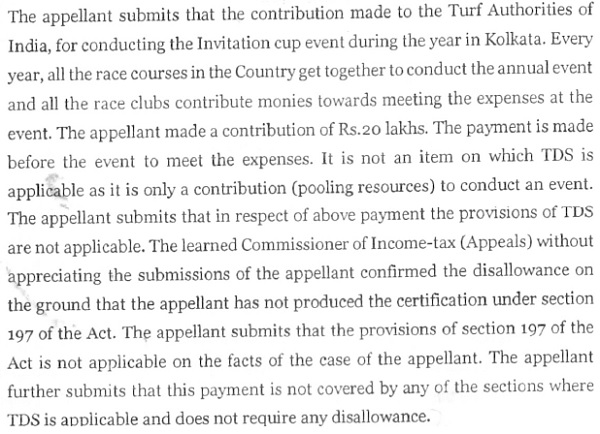
9.4 A perusal of the above said explanation would show the above said amount represents contribution made by the assessee to conduct an event. Hence, there is merit in the contention of the assessee that the above said contribution would not attract any of the TDS provisions. Accordingly, we set aside the order passed by the Ld. CIT(A) on this issue and direct the A.O. to delete this disallowance.
9.5 The Last item disallowed u/s 40(a)(ia) of the Act is dope testing charges. The assessee has offered following explanation in this regard:-
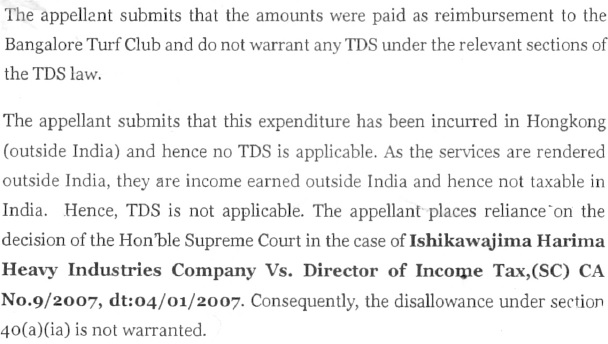
9.6 The Ld. A.R. submitted that this payment was actually made to Bangalore Turf Club in the form of reimbursement. He submitted that the dope test is carried out in Hong Kong (Outside India). Since the assessee does not have direct contact with the lab carrying out Dope test outside India, it has sent the samples to Bangalore Turf Club, which in turn, has sent the samples to Hongkong. The Ld. A.R. submitted that there is no liability to deduct TDS from these kind of reimbursements. The Ld. A.R. also submitted that even if it is considered for a moment that the assessee should be presumed to have made the payment directly to Hongkong company, yet no TDS is required to be deducted since the payment was made to a non-resident for services rendered outside India, whose income is not chargeable to tax in India.
9.7 We heard the parties on this issue and perused the record. Before us, the assessee has raised two types of contentions, viz., (a) it is a case of mere reimbursement of expenses given to Bangalore Turf Club and (b) the payments made to non-residents for services rendered outside India is not liable for deduction of tax at source u/s 195 of the Act. We notice that the submission that the dope test is carried outside India is not emanating from the orders passed by the tax authorities. With regard to the claim that it is only reimbursement of expenses incurred by Bangalore Turf club, in our view, it requires to be examined as to whether the Bangalore Turf club was liable to deduct tax at source from the payments made to the laboratories and if so, whether it has deducted tax at source. If the AO had accepted in the hands of Bangalore Turf club that the dope test charges are not liable to tax deduction at source or if the Bangalore Turf club has already deducted TDS, then, in our view, there is no requirement for the assessee to deduct TDS on such kinds of reimbursements. We notice that relevant facts have not been brought on record. We notice that the assessee has submitted before Ld CIT(A) that the AO has accepted the contention in AY 20 14-15 that the assessee is not liable to deduct TDS on such kind of reimbursements. In view of non-availability of relevant facts, we are of the view that this issue requires fresh examination at the end of AO. Accordingly, we restore the issue of disallowance made u/s 40(a)(ia) of the Act in respect of Dope Testing Charges to the file of the AO for examining it afresh after affording adequate opportunity of being heard to the assessee.
10. In the result, both the appeals of the assessee are treated as allowed for statistical purposes.
Order pronounced in the open court on 21st Apr, 2022.




